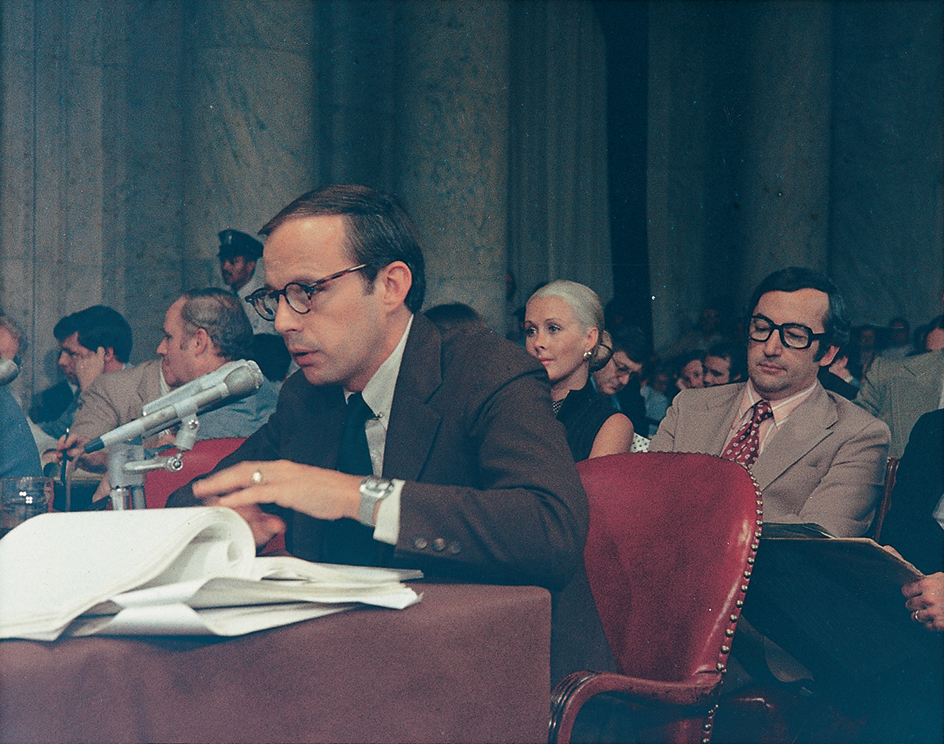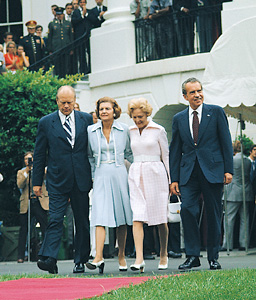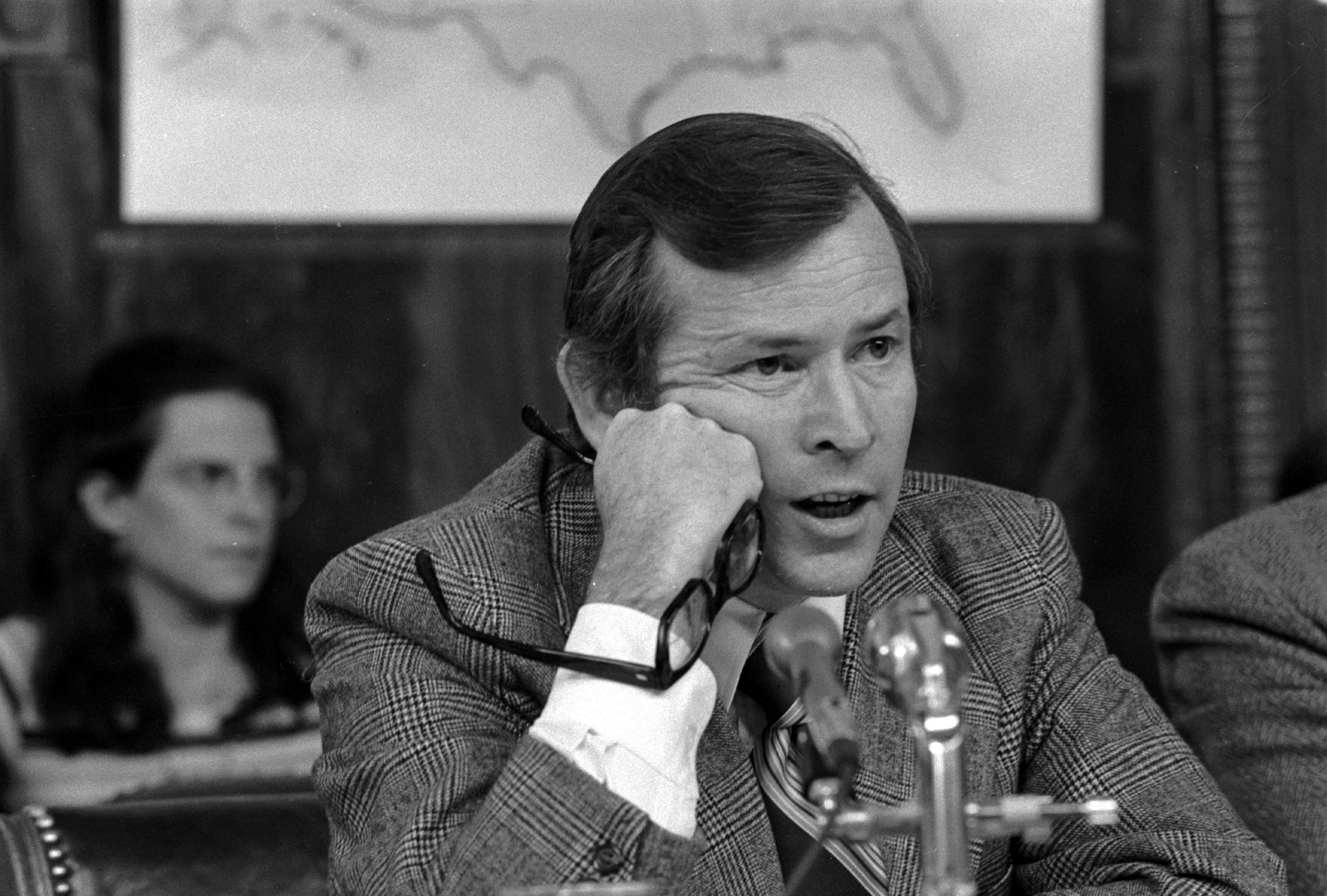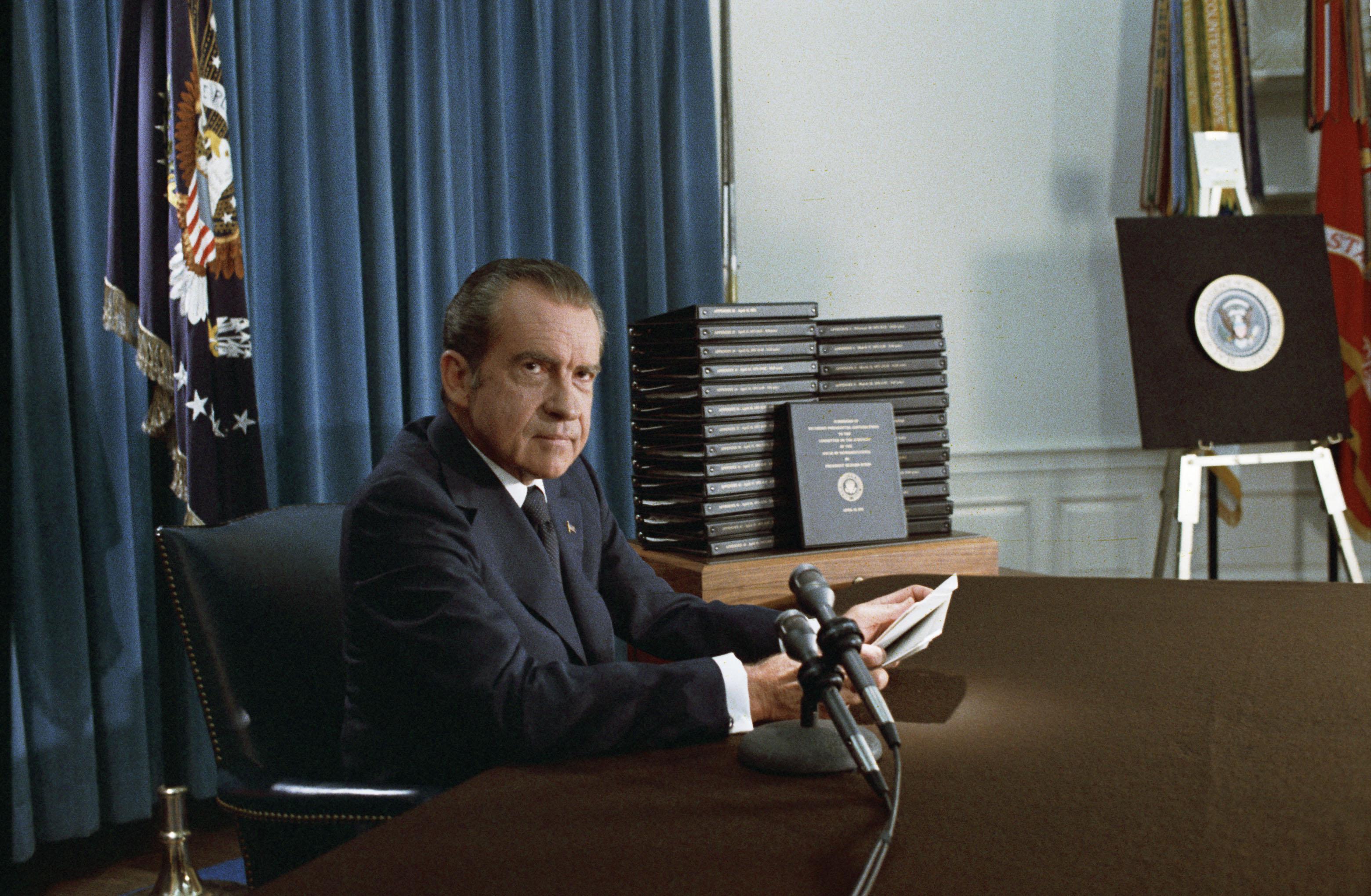Watergate was the biggest political scandal in United States history. It included illegal activities designed to help President Richard M. Nixon win reelection in 1972. Watergate resulted in Nixon’s resignation from the presidency in 1974.

Richard Nixon announces his resignation
Watergate differed from most previous political scandals because personal greed apparently played little role. Instead, Watergate represented an attack on one of the chief features of a democracy—free and open elections.
The Watergate activities included burglary, wiretapping, and violations of campaign financing laws. The scandal involved sabotage and the attempted use of government agencies to harm political opponents. It also involved a cover-up of many of those actions. About 40 people were charged with crimes in the scandal and with related crimes. Most of these people were convicted by juries or pleaded guilty.
Watergate involved more high-level government officials than any previous political scandal. It led to the conviction on criminal charges in 1975 of former Attorney General John N. Mitchell. Two of Nixon’s top aides, John D. Ehrlichman and H. R. Haldeman, were also convicted. Also in 1975, Maurice H. Stans pleaded guilty to Watergate criminal charges and was fined $5,000. Stans had been Nixon’s secretary of commerce and a leader of Nixon’s reelection campaign. Watergate also had resulted in the resignation of Attorney General Richard G. Kleindienst in 1973.
The break-in and cover-up.
The scandal took its name from the Watergate complex of apartment and office buildings in Washington, D.C. On June 17, 1972, police arrested five men for breaking into the Democratic Party’s national headquarters there. One of the burglars was James W. McCord, Jr. McCord was the security coordinator of the Committee for the Re-election of the President (CRP). The five men were indicted for a number of crimes, including burglary and wiretapping. G. Gordon Liddy, another CRP aide; and E. Howard Hunt, Jr., a White House consultant, were also indicted. In January 1973, five of the seven, including Hunt, pleaded guilty. The other two—Liddy and McCord—were found guilty by a jury. 
Nixon’s press secretary had said repeatedly that the scandal involved no member of the White House staff. But the press found evidence that White House aides had helped finance sabotage and spying operations against candidates for the 1972 Democratic presidential nomination. Reporters Carl Bernstein and Bob Woodward of The Washington Post led the investigation.
Early in 1973, evidence was uncovered that tied several top White House aides to plans for the Watergate break-in or to concealment of evidence. The evidence indicated that White House officials had tried to involve the Central Intelligence Agency and the Federal Bureau of Investigation in the cover-up. These officials falsely claimed that national security was involved.

On April 30, 1973, Nixon stated that he had no part in either planning the Watergate break-in or covering it up. He promised that the Department of Justice would appoint a special prosecutor to handle the case. In May, Archibald Cox was named to that position. Cox was a Harvard Law School professor. Also in May, the Senate Select Committee on Presidential Campaign Activities began hearings on Watergate. Senator Sam J. Ervin, Jr., of North Carolina headed the committee. Former Presidential Counsel John W. Dean III became the chief witness against Nixon in the hearings. Dean admitted that he had played a major role in a White House cover-up. He charged that Nixon knew of his activities. Dean also revealed administration plans to use the Internal Revenue Service and other government agencies to punish opponents whom the White House had placed on so-called enemies lists. Dean was later sentenced to a prison term of 1 to 4 years. After he had served four months, his sentence was reduced to that time. He was released.
The tape controversy.
In July, the Senate committee learned that Nixon had secretly made tape recordings of conversations in his White House offices since 1971. The committee and Cox believed the tapes could answer key questions raised in their investigations. They asked Nixon to supply them with certain tapes. He refused to do so. Nixon argued that, as president, he had a constitutional right to keep the tapes confidential. In August, Cox and the committee sued Nixon to obtain the tapes. United States District Court Judge John J. Sirica decided to review the tapes himself. Sirica ordered Nixon to give the tapes to him. Nixon appealed the order. But a U.S. court of appeals supported Sirica.
In October, Nixon offered to provide summaries of the tapes. But Cox declared that summaries would be unacceptable as evidence in court. He rejected the offer. Nixon ordered Attorney General Elliot L. Richardson to fire Cox. Richardson refused to do so and resigned. Deputy Attorney General William D. Ruckelshaus also resigned after being ordered to dismiss Cox. Nixon then named Solicitor General Robert H. Bork acting attorney general. Bork fired Cox. Leon Jaworski, a noted Texas attorney, later succeeded Cox.
The president’s actions angered many Americans. In October, a number of members of the House of Representatives began steps to impeach him. Later in 1973, Nixon agreed to supply the tapes to Sirica. Then it was discovered that three key conversations were missing. The White House said that the tape-recording system failed to work properly during two of the talks. The White House said that the third conversation had been accidentally erased.
In April 1974, Jaworski served Nixon with a subpoena (legal order). The subpoena ordered the president to furnish tape recordings and documents relating to 64 White House conversations. Jaworski said the materials contained evidence in the cover-up case. At the end of April, Nixon released 1,254 pages of edited transcripts of White House conversations. He said they told the full Watergate story.
Jaworski, however, insisted on receiving the original tapes and documents that he had requested. Nixon again claimed he had a constitutional right to protect confidential documents. Jaworski then sued the president in federal court. In July, the Supreme Court of the United States ordered Nixon to give Jaworski the materials. The Supreme Court ruled unanimously that a president cannot withhold evidence in a criminal case.
The cover-up trial.
In March 1974, seven former officials of Nixon’s administration or his 1972 reelection committee were indicted on charges of conspiracy in covering up the Watergate break-in. Among them were Domestic Council Chief Ehrlichman, White House Chief of Staff Haldeman, and Attorney General Mitchell. 
The trial lasted from October 1974 to January 1975. Ehrlichman, Haldeman, and Mitchell were each convicted of conspiracy, obstruction of justice, and perjury. They were sentenced to a prison term of from 21/2 to 8 years. The sentences were later reduced to 1 to 4 years.
The resignation of Nixon.
The president suffered another major setback in July 1974. The House Judiciary Committee recommended that he be impeached. The committee adopted three articles of impeachment for consideration by the full House of Representatives. The first article accused Nixon of obstructing justice in the scandal. The second article accused him of abusing presidential powers. The third article charged him with illegally withholding evidence from the Judiciary Committee. Loading the player...
Gerald Ford pardons Nixon
Nixon’s chief defenders continued to argue that the president had committed no impeachable offense. But on August 5, Nixon released additional transcripts of taped White House conversations. The transcripts convinced most Americans that Nixon had authorized the Watergate cover-up at least as early as June 23, 1972—six days after the break-in. Nixon lost almost all his remaining support in Congress. He resigned on August 9. Vice President Gerald R. Ford took office as president that day. On September 8, Ford pardoned Nixon for all federal crimes that Nixon might have committed while serving as president.
Other effects of Watergate.
In 1974, Congress approved reforms in the financing of federal election campaigns. Some reforms limit the amount of money contributors may give to candidates. Other financial reforms require detailed reporting of both contributions and expenses. Many state legislatures limited contributions and spending in state election campaigns. Many states also adopted codes of ethics for all government employees.
